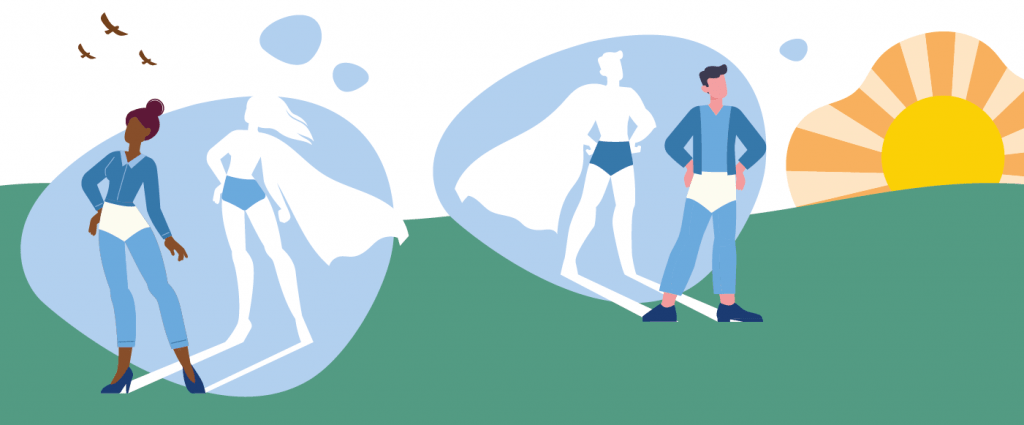How discreet incontinence underwear can boost your mood
Despite being a fairly common issue affecting 10 to 20% of Europeans1, urinary incontinence (or bladder weakness) remains a little-discussed topic.In addition, poor mental health (perhaps linked to this taboo) can both cause2and be caused by3 incontinence.
To combat this, here are our top tips for improving your mental health if you’re experiencing bladder issues, including boosting your confidence with discreet incontinence underwear.

The link between mental health and bladder weakness
Anyone who has experienced bladder weakness knows that it can be challenging, even if you’re using appropriate continence products, such as incontinence underwear. However, the impact on mental health may be more serious than you realise; for example, women with urinary incontinence are more likely to experience depression4.
Unfortunately, there’s something of a vicious circle with urinary incontinence and mental health, as the ‘fight or flight’ response triggered by anxiety and stress can cause you to urinate more frequently.5 As such, it’s easy to see why boosting your mental health can improve symptoms of bladder weakness6. Don’t worry, though – there are many simple ways to empower yourself and feel happier when you have urinary incontinence.

Improving urinary incontinence through mental healthcare
1. Lower stress levels
Studies have shown that people experiencing depression, stress or anxiety are more likely to develop incontinence.7 Therefore, it’s clear that being happier can improve your bladder health. To improve your mood, try the following stress-busting techniques:
- exercise, which reduces the emotional intensity of your feelings
- connecting with others as time with loved ones is an effective stress reliever
- ‘me time’: activities such as bubble baths and meditation
- avoiding unhealthy habits, such as alcohol, smoking and caffeine, as coping mechanisms8 (these can also exacerbate incontinence symptoms!9).

Feel confident with discreet incontinence underwear
Finding the incontinence product to suit you is important for managing bladder weakness, as they help you carry on with normal life10. There are many great options, such as adult nappies, pads and incontinence underwear. Using a product specifically designed for incontinence with moisture-wicking technologies is vital because alternatives, such as sanitary products, may leave your skin sore and uncomfortable11, affecting your self-confidence.
Discreet incontinence underwear provides a fantastic continence solution for bladder weakness.
- Our iD Pants and iD For Men absorbent underwear provide security and comfort while feeling cotton-soft and breathable.
- iD Form is a range of shaped continence pads that you combine with incontinence underwear like iD Net Pants to hold them in place. This combination is breathable, anti-leak and isn’t noticeable under your regular clothes, leaving you feeling confident.
As many people experience anxiety that they might not make it to the toilet in time12, using the correct incontinence underwear can really boost your confidence and, in turn, your mental health!
Find your happy
Did you know that happier peopleare more likely to live longer? Research has shown that more optimistic peoplehave a greater chance of living past the ripe old age of 85!13 Plus, studies have also shown that higher self-esteem positively impacts your mental health; if you’re more confident about your ability to deal with a situation, you’re less likely to get stressed about it14.
Mental health and urinary incontinence go hand in hand, so, logically, finding what makes you happy will improve symptoms of bladder weakness. Our best tips for feeling happier in your day-to-day life are:
- stop chasing happiness; this may seem counterintuitive, but if you treat happiness as a goal, your brain sees it as a reward rather than something everyone deserves to feel every day
- reframe how you view happiness; consider what makes you happy on a daily basis, no matter how small. This could be having your favourite drink, chatting to a friend on the phone or stroking a pet
- practice mindfulness; by looking inwards, you can identify your stressors and put management strategies in place to tackle them
- build your self-esteem; instead of beating yourself up about mistakes, why not talk to yourself like you would talk to a close friend?15
Even incorporating one of these tips into your daily life, whether practising meditation, using the correct incontinence underwear or cutting out one unhealthy habit helps boost your mood and, consequently, improves your incontinence symptoms!

Sources
1 “ Despite high prevalence, urinary incontinence is still very much a taboo”, European Association of Urology, July 2021, Source: https://uroweb.org/news/despite-high-prevalence-urinary-incontinence-is-still-very-much-a-taboo
2 “Is Stress Contributing to Your Incontinence?”, Lily Bird, n.d., Source: https://www.nafc.org/bhealth-blog/is-stress-contributing-to-your-incontinence
3 “How Overactive Bladder Affects Your Mental Health”, Jacquelyn Cafasso, 6 June 2021, Source: https://www.healthline.com/health/overactive-bladder/overactive-bladder-mental-health
4 “The psychosocial impact of urinary incontinence in women”, Amy J Sinclair & Ian N Ramsay, 18 July 2011, Source: https://obgyn.onlinelibrary.wiley.com/doi/full/10.1576/toag.13.3.143.27665
5 “IS STRESS CONTRIBUTING TO YOUR INCONTINENCE?”, Lily Bird, n.d., Source: https://www.nafc.org/bhealth-blog/is-stress-contributing-to-your-incontinence
6 “How Overactive Bladder Affects Your Mental Health”, Jacquelyn Cafasso, 6 June 2021, Source: https://www.healthline.com/health/overactive-bladder/overactive-bladder-mental-health
7 “6 tips for easing stress and anxiety from overactive bladder”, Morgan Meissner, 7 June 2021, Source: https://www.medicalnewstoday.com/articles/tips-for-easing-stress-and-anxiety-from-overactive-bladder
8 “10 stress busters”, NHS, 20 November 2018, Source: https://www.nhs.uk/mental-health/self-help/guides-tools-and-activities/tips-to-reduce-stress/
9 “Bladder control: Lifestyle strategies ease problems”, Mayo Clinic, 4 August 2020, Source: https://www.mayoclinic.org/diseases-conditions/urinary-incontinence/in-depth/bladder-control-problem/art-20046597
10 “Incontinence”, Age UK, 20 April 2021, Source: https://www.ageuk.org.uk/information-advice/health-wellbeing/conditions-illnesses/incontinence/
11 “Incontinence products: Urinary incontinence”, NHS, 7 November 2019, Source: https://www.nhs.uk/conditions/urinary-incontinence/incontinence-products/
12 “How stress and anxiety affect your bladder”, Marelize Wilke, 22 June 2019, Source: https://www.news24.com/health24/medical/incontinence/incontinence-in-women/how-stress-and-anxiety-affect-your-bladder-20190618
13 “If you are happy and you know it… you may live longer”, David R. Topor, 16 October 2019, Source: https://www.health.harvard.edu/blog/if-you-are-happy-and-you-know-it-you-may-live-longer-2019101618020
14 “Raising Your Self Esteem for Stress Relief”, Elizabeth Scott, 21 October 2020, Source: https://www.verywellmind.com/why-an-how-to-raise-your-self-esteem-for-stress-relief-31448204
15 “How to be happy: 6 simple steps to finding happiness”, Calmer, 24 July 2019, Source: https://www.thisiscalmer.com/blog/how-to-find-happiness-6-steps
